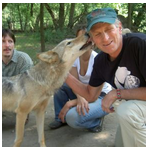
Photo from Psychology Today, https://www.psychologytoday.com/blog/animal-emotions?page=23
Last night I went to hear one of our local Boulder treasures, animal scientist Marc Bekoff, talk about improving the lives of animals—increasing our “compassion footprint.” Marc is world renowned for his studies of animal behavior. For years he has taken footage of animals playing and analyzed it frame by painstaking frame—every feint, jab, tussle, and roll measured and accounted for. In addition to his academic articles and widely read books on animal behavior, last year he came out with a children’s book, Animals at Play, showing animals learning to play fair with each other—something every kid needs to learn too.
Last night he spoke often to the children sitting on the floor in the front row: “I’m showing these pictures of people making a difference in the lives of animals. Look at these people”—he pointed to teenage girls in China organizing a Roots and Shoots chapter or people in North America or Africa rescuing abused animals. “These are wonderful people—look at what they’re doing. And lots of them are women. Girls”–he looked down at the front row, “you can do this too.”
Marc is one of those rare biologists who’s not afraid to talk about emotions in animals. “It’s simple evolutionary theory,” he said, pointing his laser light at the slide of Darwin’s theory. (Happy 200th birthday tomorrow to Darwin.) “Darwin taught evolutionary continuity, which means differences between species are differences of degree rather than differences of kind. If we have feelings, they have feelings.” Spindle cells, which play a role in cognitive and emotional brain activity, he told us, have recently been found in whales as well as in humans and apes.
Some of his slides were disturbing–animals seared, snared, or with limbs chopped off. It wasn’t anonymous suffering; these were animals he’s met in his travels, animals he referred to by name. But the night was far from a downer because these very same animals are now living in sanctuaries as far-flung as Mongolia or South Africa, and he grinned when he showed these animals after their rescue, lounging in the shade or rolling in straw. “I’m an optimist,” he said, striding around the stage in his enthusiasm. “There are marvelous people doing great things for animals everywhere in the world.”
You (and Marc) make a very good point about emotions in animals. There was a recent study in Science News that described how dogs can sense injustice — such a high-level emotion, I’d say. This is a good post for Darwin’s birthday week!
Animals showing a sense of injustice – Now that is something I would like to hear more about. Do you have the Science News citation (and URL) by chance?
From living with animals, I cannot think of an emotion that they do NOT seem to have. But it is tricky to distinguish what they are feeling from our own guesses and projections,just as with people…
Birrell
I did a little searching and found the citation: Rachel Zelkowitz, “Dogs Have a Nose for Inequity,” ScienceNOW, Dec. 8, 2008. The article is available at http://news.sciencemag.org/social-sciences/2008/12/dogs-have-nose-inequity. Researchers experimented with dogs “giving the paw,” or placing a paw in a human hand. Some dogs worked in pairs, with one dog not rewarded for giving the paw while the other was. Other dogs worked individually and were not rewarded. The unrewarded dogs in all cases showed signs of stress, like looking away or scratching, and eventually stopped cooperating. But the shortchanged dog working in a pair with a fully rewarded dog refused to cooperate twice as often as the unrewarded dog who had no one to compare herself to. It indicates that the source of distress was the unequal treatment.